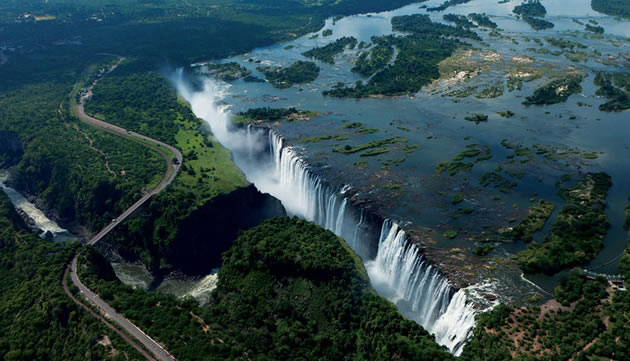Tourism has capacity to build peaceful societies

 Lovemore Chikova News Editor
Lovemore Chikova News Editor
Tourism has proved to be one of the world’s fastest growing economic sectors, contributing significantly to the Gross Domestic Product of various nations.
Yet the potential of this sector as an instrument of helping bring peace to the world has not been fully exploited.
With international tourist arrivals totalling almost 1,2 billion last year and expected to reach 1,8 billion by 2030, such large numbers can be useful in spreading peace.
It is important that more than half of the 1,8 billion tourist arrivals by 2030 will be in emerging economies and developing countries.
More statistics from the United Nations World Tourism Organisation (UNWTO) show that tourism is accounting for 10 percent of the global GDP, 30 percent of the world’s trade services and one in 11 jobs worldwide.
The above figures leave no doubt that tourism is an economic powerhouse that can be used to create opportunities to improve the people’s livelihoods.
More importantly, the huge number of travellers can be fully exploited to bring a word of peace among nations and open new public diplomacy fronts.
This is why the First World Conference on Tourism for Development held in Beijing, China, last week should be viewed as one of those important steps in opening new avenues for tourism.
The theme of the conference, “Tourism for Peace and Development” was a clear indication on the direction stakeholders want the sector to take.
That Chinese Premier Li Keqiang was part of the conference, which he officially opened, signified the importance of the tourism sector to China and the world at large.
And the speakers had a clear mission: without peace there is no tourism to talk about, so why not use tourism to create peace to ensure its survival?
Premier Li’s speech was an eye opener and one of the most important as it gave direction to the conference.
“There is need to make tourism a bond of peace,” was his message, “something that contributes to friendly exchanges and harmonious relations among the people to open and inclusive development”.
One of the solutions proffered by Premier Li was that countries and regions estranged in relations need to ease restrictions on personnel flows to allow cultural exchanges and “break the ice in bilateral exchanges”.
In Zimbabwe, tourism has managed to break the barriers with other nations and among the local people, effectively contributing to peace and economic development.
Tourism and Hospitality Industry Minister Dr Walter Mzembi attended the conference in Beijing where he spoke on tourism’s role in public diplomacy following decades of isolation by the West.
The early years of the millennium saw Western countries, not happy with the land reform, issue advisories to their citizens against travelling to Zimbabwe.
For nearly a decade, tourism in Zimbabwe was almost dead as the conflict with the Western countries continued.
Zimbabwe had been virtually ex-communicated from bodies such as the UNWTO due to non-payment of membership subscription as a result of the economic problems arising from its fallout with these countries over the agrarian reform.
Inflation last recorded in December 2008 was in excess of 240 million percent, the Zimbabwe dollar was in quadrillions to the US$ and the international media onslaught had virtually collapsed the Zimbabwe brand.
In February 2009, the Government of National Unity was formed and Dr Mzembi was appointed to the Tourism and Hospitality Industry portfolio.
What he said at the conference left many delegates with no doubt that tourism can indeed be a tool for peace.
And to quote him: “I immediately recognised the potential of people-to-people diplomatic potential of the tourism sector and how it would underwrite inter-state diplomacy going forward,” he said while addressing a session of the conference under theme “Tourism for Peace”.
Within a few months, Zimbabwe had regained its membership to bodies such as UNWTO, World Travel Tourism Council and the Regional Tourism Organisation of Southern Africa (retosa).
It was also important that a public diplomatic offensive be launched and this set Dr Mzembi and his team on a worldwide tour.
The team reached out to leaders of countries that had imposed travel restrictive measures against Zimbabwe for the survival of tourism.
What followed the diplomatic efforts was a clean bill of travel first from Germany, then countries in the European Union, the United States and Japan.
People-to-people to diplomacy had won for Zimbabwe and the peace brought by the tourism actors ensure the country’s tourism sector would easily return to normal.
The ultimate destination of the diplomatic offensive was the co-hosting of the 20th session of the General Assembly of the UNWTO by Zimbabwe and Zambia in 2013.
In between, tourism diplomacy had seen Zimbabwe elected to the executive council of the UNWTO, got successive chairmanship of retosa, was two-time president of the African Travel Association and now second time chairperson of the UNWTO Commission for Africa.
Dr Mzembi was able to graphically describe the situation at the Beijing conference.
“Unfortunately, following the inception of our agrarian reform, the response of a section of the international community created near similar conditions to those that prevailed pre-1980 for tourism, similar to war conditions,” he said.
“The response in itself by the section of the international community was a failure of State diplomacy. Tourism then came to the rescue, refusing to be a victim of collateral damage arising out of the failure of State diplomacy.
“Tourism has a natural patent to soft power and it should be deployed in public and people-to-people diplomacy.”
Going forward, it is clear, and living in the era of terrorism, that it is not hard power alone that will defeat the scourge.
It is complementary action from soft power that will ultimately win because terrorism is conceived and transported in the mind.
Dr Mzembi provided useful insights to support this argument.
“It is an ideological mindset and the citizen diplomacy will overwhelm terror because you cannot ask seven billion people to stay at home — 1,2 billion people are already part of the travel revolution,” he said.
Zimbabwe’s tourism minister observed that no country is safe from the scourge of terror and, therefore, “an attack on humankind no matter how geographically remote or distant is an attack on us all”.
The terror problem is rampant and requires global solutions, he said. It also should not just deal with outcomes and symptoms, but go to the causes.
“What really causes terror?” he asked the delegates. “We must look critically at current sources of terror, that it is not a coincidence that they appear to be from collapsed States, arising out of interventions in internal matters of targeted regimes.
“There is a link also with the emerging current refuge crisis in Europe.”
As more people travel around the world, they must be treated as ambassadors of goodwill who bring an olive branch of peace to their hosts.
And the number is expected to increase exponentially in the next decade, considering that in 1950 there were just 25 million international travellers.
Tourism definitely has the capacity to fight poverty and build peaceful societies and the sector must fully contribute to the implementation of the 2030 Agenda for Sustainable Development and its 17 universal goals.
It was important that the conference in Beijing was all-inclusive, with UN representatives, government ministers and high level tourism officials from across the world attending.







Comments